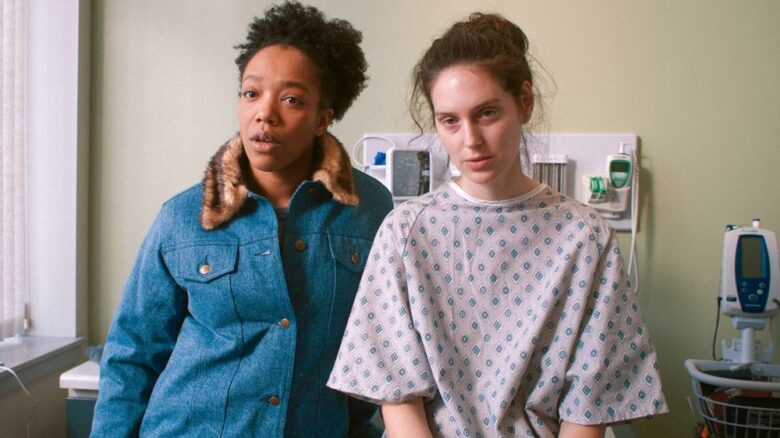I don’t know how we fix where we are right now, standing at the point where admitting you were (or did something) wrong is a sign of humiliating weakness and not humbling, sacred strength. We are stuck in an objectively horrible moment, during which careless cruelty is celebrated or, perhaps worse, completely ignored. If there is a way back from this – and “if” should be in bold, red, glittering font there – it will be because of people like writer/director Eva Victor and because of movies like Sorry, Baby.
I’m prone to hyperbole, but I’m spitting pure facts here. The way back from indecency is relearning humanity. That’s it. That’s the only way. And we won’t be able to send a representative from each marginalized group currently under attack to meet every wayward soul who has walked a path to hatred. Books, movies, TV shows, songs, paintings, dance, and many more are weapons of mass empathy. The great ones are guided missiles, striking deep inside bunkered hearts. The best ones are nuclear blasts: indefensible and seismic.
Sorry, Baby is a best one. Although wholly different from Fleabag in content, that’s maybe the best touchstone for how Victor stitches a broken heart together with wry comedy. Much like Phoebe Waller-Bridge’s masterwork, Sorry, Baby appears simplistic but is devilishly complex and impressively meticulous.
Agnes (Victor) is a literature professor living in a ramshackle house in New England with a cat that more or less adopted itself. She had a bad thing happen to her a few years prior, during the end of graduate school. Only her best friend, Lydie (Naomi Ackie), really understands “the thing.” But Lydie left after her thesis was done. She married Fran (ER Fightmaster) and recently became pregnant via sperm donor.
Still fragile, Agnes struggles with Lydie’s absence and reels from her baby news. In quiet, charming chapters, the movie reveals “the thing.” It does so in maybe the most gentle, thoughtful way I’ve ever seen, read, or heard. Watching the kind and brilliant Agnes try to navigate a brutal and insensitive world with grace and humor makes this, inarguably, the finest film I’ve seen this year.
Victor is so good as Agnes. So, so good. The character is imminently endearing: impossibly clever but equally tender. Victor’s writing and direction are probably even better. At the precise moment when I was about to surrender to rage at how ugly the world is to so thoroughly mistreat someone like Agnes, we get a scene of simple compassion that knocked the wind out of me.
That one scene would have been enough for me to dump out a bag full of Letterboxed stars, to add a plus next to the grade A. In interviews, Victor has discussed shunning black and white, binary thinking. Sorry, Baby puts that philosophy into perfect practice so hard, that it rattled me on the question I’m guessing a lot of us have been struggling with.
How we answer the question “are people inherently good or bad” is usually a mood ring. I haven’t found a way to get to “good” as a response in quite some time. It’s insane to say “good.” It’s impossible. Sorry, Baby got me to change my answer from “bad.” It made me stupidly realize the obvious answer is “neither.” We may be born with characteristics or circumstances that predispose to one or the other, but we have the capacity for either and both. That may not sound like optimism, but it is a hell of a change.
The problem with this review is that, if you trust me, you’re going to watch Sorry, Baby expecting it to dazzle you. Sorry, baby. It’s not that kind of movie. Too often, we expect flash and sparkle, innovation and novelty when we hear something is great or, in this case, perfect. It is flawless and genuine. It made me feel so deeply. I apologize if this builds it up too much for you. I just loved it too much to pretend otherwise.
Grade = A+
Other Critical Voices to Consider
Shubhra Gupta at The Indian Express says “What we are left with is equal parts heart-in-mouth and bracing: dealing with muted trauma is exhausting and never-ending– a panic attack anywhere, anytime can be the result– and how, sometimes, all one needs is a stranger’s kindness and a good sandwich, to make things better.”
Hanna Flint at Time Out says “Victor understands just how excruciating trauma can be when it manifests at unexpected times and in awkward places. Whether that be a dinner party with old friends, jury duty or even while driving in her car, these scenarios are bolstered with dry wit, gallows humour and a supporting cast offering lightness even at its darkest.”
Jessica Gonzales at Geek Vibes Nation says “Victor has crafted a minimalistic, heartbreaking, and funny film about trauma and its insidious nature. The world that she has created is three-dimensional and fully alive in this powerful feature debut. She shows us that life is messy, but there is still humor to be found in even the darker and more astounding aspects of it.”

